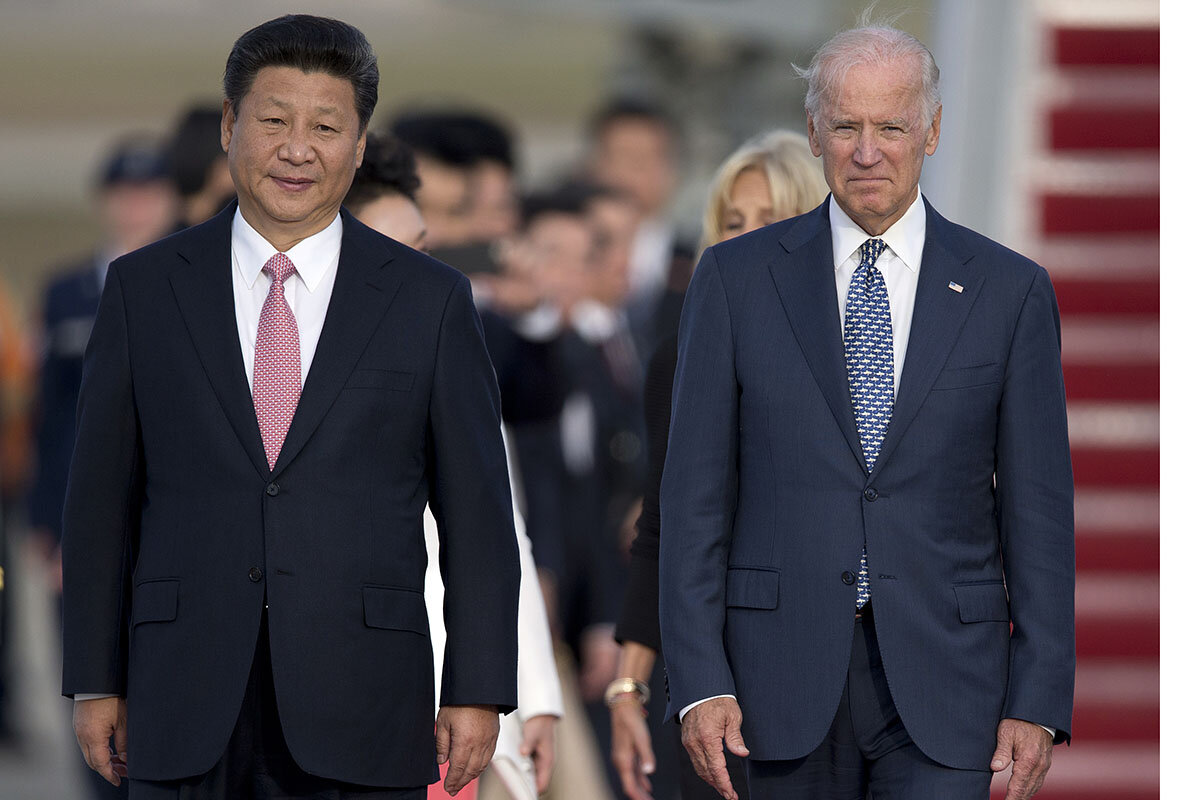Biden or Trump? Rival policies on China keep world guessing
| London
It may get lost amid the sound and fury of the most bitterly contested U.S. presidential campaign in decades, but American voters will be deciding more than just their own country’s future during the homestretch weeks until Election Day.
Foreign policy – above all, America’s intensifying rivalry with an increasingly powerful, autocratic and assertive China – is also on the ballot.
The choice could determine the future of the world economy and the course of globalization. More immediately, Washington’s approach will impact how other countries around the world, especially traditional U.S. allies, deal with the Chinese – one reason that they’ll be following the election returns in November with a particularly close eye.
Why We Wrote This
Foreign policy is not grabbing the U.S. presidential election headlines, but the next administration’s China policy will have major repercussions – economic and political – for the rest of the world.
No matter who wins, the chances of an early thaw with Beijing are remote. In a dramatic political shift from just a few years ago, neither of America’s two main political parties, and neither of the presidential candidates, appears in a mood for that.
Judging by President Donald Trump’s first term in office, his approach would be bilateral, a kind of mano-a-mano contest with Chinese leader Xi Jinping, deploying the full range of economic and political pressure tools to prize concessions from Beijing. His Democratic Party challenger, Joe Biden, has long favored a multilateral approach, rooted in the view that the U.S. can exert more influence and pressure in concert with international partners.
Navigating the U.S. rivalry with China, the world’s second-largest economy, will be a dauntingly difficult task for either of them. Over the past two decades Beijing has become a major player in world trade, investment, and financial markets. It has also been pouring enormous resources into high-technology research and development.
Not that long ago, America’s foreign-policy establishment (including Joe Biden) was encouraging China’s economic rise, hoping that a China integrated into the world economy would become less authoritarian and more open to international cooperation.
But even before Mr. Trump’s election in 2016, doubts were hardening. Barack Obama and then-Vice President Biden had become increasingly concerned by China’s intellectual property theft, restraints on market access, and anti-competitive state subsidies – as well as its military expansion in the South China Sea.
Hopes of liberalization have faded. Mr. Xi has tightened his hold on power and clamped down on dissent; earlier this year he effectively tore up the “one nation, two systems” agreement under which Britain returned Hong Kong to Chinese rule, launching a security crackdown on pro-democracy activists there.
And then came the COVID-19 pandemic, originating in China and initially hidden from the outside world. China’s international reputation plummeted, especially once it had turned back the virus at home and launched a propaganda offensive criticizing Western nations’ response.
But an even more profound impact of the pandemic on U.S. politics was that it drove home America’s growing economic interdependence with the Chinese: a wide range of urgently needed protective equipment could be found only in China.
Over the past few months, Mr. Trump has ratcheted up pressure on Beijing, significantly tightening U.S. sanctions, due to take effect this month, on the giant Chinese technology company Huawei. Unless waivers are granted, the move to deprive the company of essential microchips could have an enormous impact on its production capacity.
The case of Huawei – which, with the help of state loans, has become the world’s leading supplier of telecommunications network infrastructure – explains why the U.S. election, and Washington’s future approach to relations with China, are of such keen interest worldwide.
Washington has been leaning on other countries, especially traditional allies in Europe, to follow its lead and exclude the Chinese company from any involvement in their new 5G telecoms networks. And Mr. Trump’s sanctions might mean that Huawei would not even have the hardware it needs to build European 5G networks.
A Biden administration would be unlikely to change Washington’s view of Huawei, if only because of a broad consensus in the American security community that the company could use a 5G role to steal information.
But Mr. Biden has stressed that if the U.S. is to reduce its dependence on Chinese suppliers in key sectors, the country will have to invest in its own domestic research, innovation and production. With signs that European nations are also keen to build up capacity in firms nearer to home, like the Swedish firm Ericsson and Finland’s Nokia, a Biden administration would likely seek a coordinated approach among U.S. allies.
On trade, Mr. Biden seems increasingly to share Mr. Trump’s view of the need to take a tougher line against Chinese practices. Yet the likely shift would be away from using tariffs as a unilateral tool, in favor of a joint strategy with allies, both in Europe and Asia.
Which approach would better manage and recalibrate ties with China remains a matter of intense partisan debate as polling day approaches. But as both parties frame the election as a critical choice for America’s future, the question of future U.S. policy toward Beijing is a major reason why the rest of the world is watching too.










